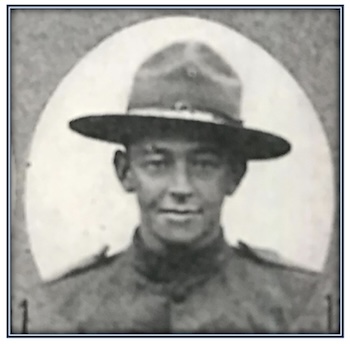Letter from Lyndonville soldier in 1918 told of horrors on Hindenburg Line
‘It was a terrible sight to see the fellows I had been with the last two years blown to pieces’
By Catherine Cooper, Orleans County Historian
“Illuminating Orleans” – Volume 4, Number 35

Pvt. Harold P. Wirth Co, F., 108th Regiment
LYNDONVILLE – The following letter was published in the Lyndonville Enterprise on November 7, 1918:
Co. F., 108th Infantry,
France, Oct. 6, 1918
Dear Friends,
Have a chance to again do some writing. I am down in a dugout, beside a little fire.
I have gone through a ten-day period that I never want to witness again, for it has been awful. Our division has gone over the top and this battalion was the first to cross the famous Hindenburg line – a line of trenches that the English claimed could never be broken. Cos. E and F were the first ones over the line and suffered heavily for it. We have a number killed, wounded and gassed, and the rest are very lucky to be alive.
Some of the boys who came back found wine, eggs, bread and other eats in Jerry’s big dugouts. Some of their dugouts are three stories deep and all built of concrete.
Captain Thompson is thought more of than ever now, and this Battalion will swear by him, and we hear that General Pershing thinks the “Skipper” is O. K. He is burned all over the face with mustard gas, but never once flinched and even attempted to re-organize the stragglers who got back and go after the Huns again.
It was a terrible sight to see the fellows I had been with the last two years blown to pieces, others wounded and still they wore big grins on their faces and told of how they did it. One sergeant in our company had four bullets in his body and they sent four Jerries out to carry him in, and as they picked him up, he said to them: “I will kill every darned one of you if you touch me” He wanted his own pals to carry him. He was shot twice and kept on going, then got two more and had to lie down.
Medina will get an awful blow when the list comes in, and it will likely be there before you get this.
It will seem good when we get back out of here and live as civilians again.
Love to all.
Harold P. Wirth
P.S. Will be home for Christmas dinner.
Harold P. Wirth did not make it home for Christmas dinner that year, but he was one of the lucky ones who made it through “to live as a civilian again.” He had enlisted as a company cook with Co. F, 108th Inf. New York National Guard on April 9, 1917, served overseas from May 18, 1918, and was discharged May 6, 1919.
The son of John G. and Grace Faulkner Wirth, he was born in Plain View, Nebraska on August 1, 1883. The family had close connections with Lyndonville. Following his discharge, Harold returned to this area and worked for five years at Lyndonville Canning. He then accepted a position with the Thomas Daggitt Canning Company in Grand Rapids, Michigan and later as superintendent of the Red Creek Canning factory in Wayne, New York.
Harold was one of the many WWI veterans afflicted with tuberculosis and was a patient at the Veterans T.B. hospital in Tupper Lake, New York. He died at the Veterans Hospital in Batavia, NY on Sept. 21, 1957, and was buried at Huron Evergreen Cemetery in Wayne County. Harold had been active in the Wolcott Post 881, American Legion. Both the Post and the cemetery are located just off Route 104 in Wayne County.
As Harold indicated in his letter, Colonel Thompson’s list was grim: between Sept. 27 and Nov. 1, 1918, 25 members of the company had been killed, 85 wounded, 18 were still in hospital and 11 had been cited for awards.
On Veterans Day, we remember, recognize and honor those who have served and are serving in the military.


























































